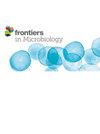The microbiota and metabolome dynamics and their interactions modulate solid-state fermentation process and enhance clean recycling of brewers’ spent grain
IF 4
2区 生物学
Q2 MICROBIOLOGY
引用次数: 0
Abstract
The massive yield of brewers’ spent grain (BSG) waste inevitably threaten environmental health. Here, solid-state fermentation (SSF) technology featuring multi-strain (MS) inoculation and high-throughput sequencing technology were employed to facilitate the sustainable and clean recycling of BSG waste while revealing the associated underlying microbiological and metabolic mechanisms. MS inoculation displayed a lower pH value (3.91 vs. 4.12) and neutral detergent fiber content (446.24 vs. 476.23 g/kg DM), a higher levels of lactic acid (86.64 vs. 33.07 g/kg DM), acetic acid (6.13 vs. 4.87 g/kg DM), propionic acid (2.78 vs. 2.18 g/kg DM) and crude protein (307.5 vs. 289.15 g/kg DM) than those in the control group. Moreover, MS inoculation inhibited the formation of non-protein-N and ammonia-N, and spoilage microorganism resuscitation, while enhanced substrate preservation. Microbiologically, during the SSF, the group treated with MS inoculation exhibited an increase in the relative abundance of微生物群和代谢组动态及其相互作用调控固态发酵过程,促进酿酒废谷的清洁回收利用
酿酒废谷(BSG)废弃物的大量产生不可避免地威胁着环境健康。在此,我们采用了固态发酵(SSF)技术、多菌种(MS)接种技术和高通量测序技术,以促进啤酒糟废弃物的可持续清洁回收利用,同时揭示相关的潜在微生物和代谢机制。与对照组相比,MS 接种组的 pH 值(3.91 vs. 4.12)和中性洗涤纤维含量(446.24 vs. 476.23 g/kg DM)较低,乳酸(86.64 vs. 33.07 g/kg DM)、乙酸(6.13 vs. 4.87 g/kg DM)、丙酸(2.78 vs. 2.18 g/kg DM)和粗蛋白(307.5 vs. 289.15 g/kg DM)含量较高。此外,MS 接种抑制了非蛋白氮和氨氮的形成以及腐败微生物的复苏,同时提高了基质的保存率。微生物方面,在 SSF 期间,接种 MS 的处理组显示出白色念珠菌(0.58%∼6.60%)、魏氏菌(6.22%∼15.42%)、肠球菌(3.15%∼9.酵母菌(6.22%∼15.42%)、肠球菌(3.15%∼9.08%)、芽孢杆菌(17.63%∼31.29%)、乳酸杆菌(12.89%∼8.29%)、假交替单胞菌(12.87%∼16.29%),而不动杆菌(0.79%∼0.02%)和肠杆菌科(0.78%∼0.24%)的相对丰度有所下降。代谢方面,淀粉和蔗糖代谢、精氨酸和脯氨酸代谢以及苯丙氨酸代谢对 SSF 期间 MS 发酵的挤压型 BSG 的质量有显著影响。对微生物群、代谢物和发酵参数之间相关性的研究表明,微生物与环境因素之间复杂的相互作用影响着代谢物的产生。总之,接种 MS 提高了发酵质量和稳定性,促进了 BSG 的清洁回收,这与微生物、环境因素和代谢物产生之间复杂的相互作用有关。
本文章由计算机程序翻译,如有差异,请以英文原文为准。
求助全文
约1分钟内获得全文
求助全文
来源期刊

Frontiers in Microbiology
MICROBIOLOGY-
CiteScore
7.70
自引率
9.60%
发文量
4837
审稿时长
14 weeks
期刊介绍:
Frontiers in Microbiology is a leading journal in its field, publishing rigorously peer-reviewed research across the entire spectrum of microbiology. Field Chief Editor Martin G. Klotz at Washington State University is supported by an outstanding Editorial Board of international researchers. This multidisciplinary open-access journal is at the forefront of disseminating and communicating scientific knowledge and impactful discoveries to researchers, academics, clinicians and the public worldwide.
 求助内容:
求助内容: 应助结果提醒方式:
应助结果提醒方式:


